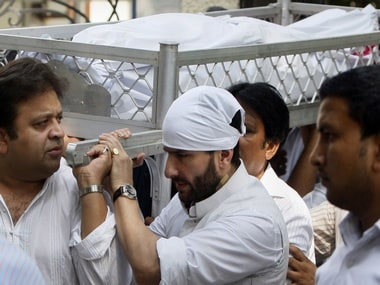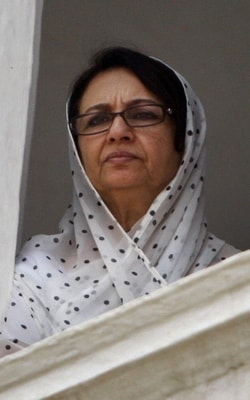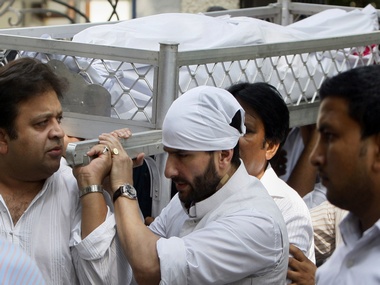In death, Mansur Ali Khan of Pataudi reminded us of what we ignored in life. His faith. Whether as a prince of cricket or a poster boy for Gwalior suiting, he never wore his identity on his sleeve. And I don’t know if Pataudi was indeed a religious man. But in his last rites, his family returned to his religion – to the Friday prayer, the sermon from a maulana, the men with white kerchiefs knotted around their heads, the clumps of earth tossed on the coffin. “I wonder what will happen to Sharmila when her time comes,” mused my mother as she watched the funeral procession on television. “I guess now she is a Muslim too. I’d forgotten that.” [caption id=“attachment_94358” align=“alignright” width=“380” caption=“The body of Mansur Ali Khan Pataudi is carried by his son Saif Ali Khan during his funeral in New Delhi. AP”]
 [/caption] Sharmila Tagore became Ayesha Begum when she married the young Nawab back in 1969. It caused a huge stir in her native Bengal, perhaps even more so than when the Satyajit Ray heroine traded Kolkata in for Bollywood, bouffants and the butterfly-knot blouse. But over the decades, she settled back down to being Sharmila Tagore again. Married to Tiger; their son Saif a film star. Their religion quietly eclipsed by their stardom and success. We’ve come a long way from the days when Mohammad Yusuf Khan rechristened himself Dilip Kumar, and Mahjabeen Bano transformed herself into Meena Kumari. In those days it was fine to have a Muslim name if you wanted to be a lyricist (it gave you some Urdu poetry, mushaira street cred). But if you wanted to be a real matinee idol with appeal across the length and breadth of the country, you didn’t advertise your Muslim-ness in your name. [caption id=“attachment_94381” align=“alignleft” width=“250” caption=“Sharmila Tagore. AP”]
[/caption] Sharmila Tagore became Ayesha Begum when she married the young Nawab back in 1969. It caused a huge stir in her native Bengal, perhaps even more so than when the Satyajit Ray heroine traded Kolkata in for Bollywood, bouffants and the butterfly-knot blouse. But over the decades, she settled back down to being Sharmila Tagore again. Married to Tiger; their son Saif a film star. Their religion quietly eclipsed by their stardom and success. We’ve come a long way from the days when Mohammad Yusuf Khan rechristened himself Dilip Kumar, and Mahjabeen Bano transformed herself into Meena Kumari. In those days it was fine to have a Muslim name if you wanted to be a lyricist (it gave you some Urdu poetry, mushaira street cred). But if you wanted to be a real matinee idol with appeal across the length and breadth of the country, you didn’t advertise your Muslim-ness in your name. [caption id=“attachment_94381” align=“alignleft” width=“250” caption=“Sharmila Tagore. AP”]
 [/caption] Today, however, our celluloid dreams are ruled by the Khans: Shah Rukh, Salman, Aamir. This is indeed a sign of progress. (Though a Khan still isn’t welcome when renting a flat in Mumbai.) But as our nation becomes more cosmopolitan, the politics of religion, appearance, and assimilation have become more nuanced. There is no need any more to do something as drastic and overt as change your name. There are other ways to signify your lack of dogma, your assimilation, your Indian-ness. And to play down any identity that may signify otherwise. Marriage, for example, is one signifier. Minority politicians in the United States often show up on the campaign trail with their white spouses to subtly indicate crossover appeal. It’s a way of signaling that they won’t be captive to a minority’s self-interest. In other areas, it’s also a sign of success, a symbol of having assimilated fully into white America. (Barack Obama, of course, had the reverse problem. Son of a white mother, he had to prove to African Americans that he was black enough.) Continued on the next page.. In India, a spouse from a non-Muslim community is an unambiguous symbol of a commitment to secularism. None of the Bollywood Khans have married Muslim women. Saif Ali Khan was married to Amrita Singh, and is due to marry Kareena Kapoor. Aamir and Shah Rukh are both married to Hindu women. They did not seek out their wives as part of some PR campaign to make themselves to the masses. But their inter-faith marriages are important in establishing their secular credentials — credentials that are required of any Muslim icon.
Media profiles
of Shah Rukh Khan belabour his non-traditional background: “He was born a Muslim, went to a Christian school and has a Hindu wife and two secular kids and did I forget to mention he also happens to be the most famous Indian. Shahrukh Khan is the true son of India…” Abdul Kalam we are told is “200 percent Indian,” as if 100 percent is not enough. He does his Muslim prayers and is also a Ram-bhakt. [caption id=“attachment_94385” align=“alignleft” width=“250” caption=“Bollywood actor Salman Khan lights an oil lamp as he arrives at Taj Hotel in Colombo. Reuters”]
[/caption] Today, however, our celluloid dreams are ruled by the Khans: Shah Rukh, Salman, Aamir. This is indeed a sign of progress. (Though a Khan still isn’t welcome when renting a flat in Mumbai.) But as our nation becomes more cosmopolitan, the politics of religion, appearance, and assimilation have become more nuanced. There is no need any more to do something as drastic and overt as change your name. There are other ways to signify your lack of dogma, your assimilation, your Indian-ness. And to play down any identity that may signify otherwise. Marriage, for example, is one signifier. Minority politicians in the United States often show up on the campaign trail with their white spouses to subtly indicate crossover appeal. It’s a way of signaling that they won’t be captive to a minority’s self-interest. In other areas, it’s also a sign of success, a symbol of having assimilated fully into white America. (Barack Obama, of course, had the reverse problem. Son of a white mother, he had to prove to African Americans that he was black enough.) Continued on the next page.. In India, a spouse from a non-Muslim community is an unambiguous symbol of a commitment to secularism. None of the Bollywood Khans have married Muslim women. Saif Ali Khan was married to Amrita Singh, and is due to marry Kareena Kapoor. Aamir and Shah Rukh are both married to Hindu women. They did not seek out their wives as part of some PR campaign to make themselves to the masses. But their inter-faith marriages are important in establishing their secular credentials — credentials that are required of any Muslim icon.
Media profiles
of Shah Rukh Khan belabour his non-traditional background: “He was born a Muslim, went to a Christian school and has a Hindu wife and two secular kids and did I forget to mention he also happens to be the most famous Indian. Shahrukh Khan is the true son of India…” Abdul Kalam we are told is “200 percent Indian,” as if 100 percent is not enough. He does his Muslim prayers and is also a Ram-bhakt. [caption id=“attachment_94385” align=“alignleft” width=“250” caption=“Bollywood actor Salman Khan lights an oil lamp as he arrives at Taj Hotel in Colombo. Reuters”]
 [/caption] But these credentials, however impressive, can be easily questioned. As when a reporter asked Salman Khan why Dabangg was being advertised as an Eid release and not a Ganesh Chaturthi release. An absurd question that nevertheless received wide attention, and required
an elaborate defense
in various news reports:
[/caption] But these credentials, however impressive, can be easily questioned. As when a reporter asked Salman Khan why Dabangg was being advertised as an Eid release and not a Ganesh Chaturthi release. An absurd question that nevertheless received wide attention, and required
an elaborate defense
in various news reports:
Who can forget that Salman Khan’s father Salim Khan has been one of the staunchest supporters of secularism and celebrates several Hindu festivals at his home in Bandra. Even, Salman Khan is very fond of Ganpati festival and takes part every year. In fact, Sallubhai even attended some Dahi-handi functions associated with Janmashtami recently in Mumbai.
Shah Rukh Khan might slip in a thank Allah in his Twitter stream about Ra-One, but being Muslim and famous is always risky business. More so, if you choose to speak as a Muslim. Shabana Azmi is no fool. Daughter of communist intellectuals, she is being very deliberate when she describes herself as “a daughter, a wife, a mother, a woman, an actress, an Indian and a Muslim.” And when she said Indian democracy had been unfair to Muslims, she knew she was stirring up a hornets’ nest. Her critics immediately drew the usual comparisons to the status of Hindus in Pakistan. If Shabana was so unhappy in India, why didn’t she just move to Lahore? The BJP called her “uncharitable and unfair” and trotted out its usual counter-proof of Muslim success in secular India: cricket, Bollywood, Supreme Court, even the President of India. As a successful Muslim, it’s regarded as somewhat gauche, regressive and slightly ungrateful to bring up “Muslim” issues, unless it’s the family’s heirloom biryani recipe. As a minority you just need to be grateful for all that the Indian democracy has to offer, and not talk about things like tokenism and discrimination. You can’t be too Muslim. A democracy is only as strong as how secure its minorities feel within its composite culture. Tolerance for difference is not the same as embracing vote-bank politics, or excusing all kinds of evil in the name of God. It does, however, mean not requiring some of your citizens to carefully excise a part of their identity in order to be accepted. Or to expect them to do so in order to prove their Indian-ness. (Big B, for example, can do innumerable temple tours, never express any interest in the Koran, and still be considered a great Indian.) The success of our democracy – and its dream of ’national integration’ — is not that a Saif Ali Khan can be a successful Bollywood star. Or that his father captained the Indian cricket team at 21. Or even that they are part of an mixed faith family. Or that their religion is “a non-issue” to millions of us. The real sign of hope is our willingness to fully accept them as part of who we are. We may have loved Pataudi for his cosmopolitan panache, but we embraced him more fully in the ultimate rituals of life and death – when the time-tested traditions of his faith were in full view of the television camera. There is something very touching about that. Something very real. And rooted. Something, dare I say, very Indian.
)